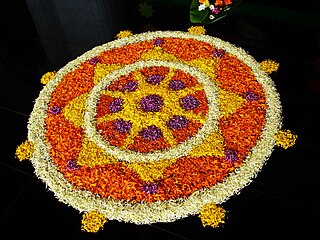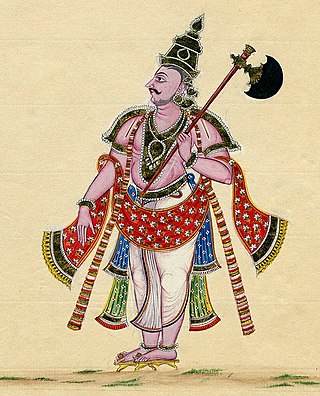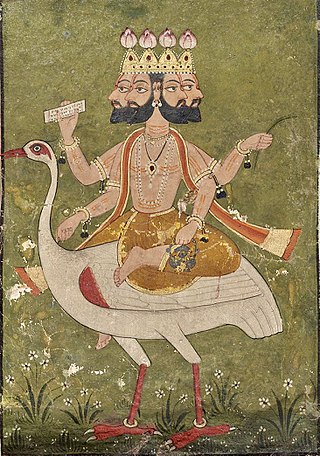
Parashurama, also referred to as Rama Jamadagnya, Rama Bhargava and Virarama, is the sixth avatar among the Dashavatara of the preserver god Vishnu in Hinduism. He is believed to be one of the Chiranjivis (Immortals), who will appear at the end of the Kali Yuga to be the guru of Vishnu's tenth and last incarnation, Kalki.

Shesha, also known by his epithets Sheshanaga and Adishesha, is a serpentine demigod (naga) and king of the serpents (Nagaraja), as well as a primordial being of creation in Hinduism. In the Puranas, Shesha is said to hold all the planets of the universe on his hoods and to constantly sing the glories of Vishnu from all his mouths. He is sometimes referred to as Ananta Shesha.

Kalki, also called Kalkin, is the prophesied tenth and final incarnation of the Hindu god Vishnu. According to Vaishnava cosmology, Kalki is destined to appear at the end of the Kali Yuga, the last of the four ages in the cycle of existence (Krita). His arrival will mark the end of the Kali Yuga and herald the beginning of the Satya Yuga, the most virtuous age, before the ultimate dissolution of the universe (Mahapralaya).
Kali Yuga, in Hinduism, is the fourth, shortest, and worst of the four yugas in a Yuga Cycle, preceded by Dvapara Yuga and followed by the next cycle's Krita (Satya) Yuga. It is believed to be the present age, which is full of conflict and sin.

Onam is an annual harvest and Hindu cultural festival celebrated mostly by the people of Kerala. A major annual event for Keralites, it is the official festival of the state and includes a spectrum of cultural events.
"God's Own Country" is a phrase meaning an area, region or place supposedly favoured by God.

Mahabali, also known as Bali, Indrasenan, or Māveli, is a daitya king featured in Hinduism. He is the grandson of Prahlada, and a descendant of the sage Kashyapa. There are many versions of his legend, in ancient texts such as the Shatapatha Brahmana, Ramayana, Mahabharata, and several Puranas. According to Hindu literature, he was blessed to be one of the Chiranjivi, a group of seven immortals, by the Vamana avatar of Vishnu and reigns in the Sutaloka.

Dhanvantari is the physician of the devas in Hinduism. He is regarded as an avatar of Vishnu. He is mentioned in the Puranas as the god of Ayurveda.

Treta Yuga, in Hinduism, is the second and second-best of the four yugas in a Yuga Cycle, preceded by Krita (Satya) Yuga and followed by Dvapara Yuga. Treta Yuga lasts for 1,296,000 years.

Guruvayurappan also rendered as Guruvayoorappan, is a form of Vishnu worshipped mainly in Kerala, India. He is the presiding deity of the Guruvayur Temple, who is worshipped as Krishna in his child form, also known as Guruvayur Unnikkannan. The temple is located in the town of Guruvayur, Thrissur, Kerala, which is named after the deity.

Parashu is the Sanskrit word for a battle-axe, which can be wielded with one or both hands.

The Dashavatara are the ten primary avatars of Vishnu, a principal Hindu god. Vishnu is said to descend in the form of an avatar to restore cosmic order. The word Dashavatara derives from daśa, meaning "ten", and avatāra, roughly equivalent to "incarnation".

The Vaikom Sree Mahadeva Temple is a temple dedicated to the Hindu god Shiva in Vaikom, Kottayam, Kerala, India.

Brahma is a Hindu god, referred to as "the Creator" within the Trimurti, the trinity of supreme divinity that includes Vishnu and Shiva. He is associated with creation, knowledge, and the Vedas. Brahma is prominently mentioned in creation legends. In some Puranas, he created himself in a golden embryo known as the Hiranyagarbha.

Mahendragiri, is a mountain in Rayagada block of the district of Gajapati, Odisha, India. It is situated amongst the Eastern Ghats at an elevation of 1,501 metres (4,925 ft). The second highest mountain of odisha.

Mango Meadows is an agricultural theme park in Kaduthuruthy, Kerala, India. With more than 4800 species of plants, including 1900 species of medicinal plants, 700 species of trees, and 900 species of flowering plants, it is one of the most biodiverse places on earth. Rare species like the Ficus alii tree or Ficus maclellandii, Beggar’s bowl or Calabash, Camphor tree or Cinnamomum camphora, Damas tree or Conocarpus lancifolius, Kattupoovarash or Rhododendron arboreum, Rudraksha or Elaeocarpus ganitrus are present in the park.

Parashurama Theme Park is a tourist destination built on Ummikkal hill in Bailur near Karkala in Udupi district. A bronze statue of Lord Vishnu's sixth avatar, Parashurama, is placed on the top of the building on the hill. This bronze statue is 33 feet tall, holding an axe in right hand, bow in left hand and raised left leg.
Nellikkuzhi Kuriakose Kurian, also known as N K Kurian is the architect and visionary behind Mango Meadows Agricultural Theme Park in Kerala, India's first agricultural theme park. and a winner of the Garshom International Awards. Mango Meadows took over 14 years to complete and spans 30 acres of land, featuring an extensive variety of plants and trees. Mango Meadows combines agriculture and tourism to provide an immersive farming experience. The park is home to over 4,800 species of plants and trees, showcasing various sustainable farming techniques. Kurian advocates for preserving natural resources and biodiversity to ensure a sustainable future. Through Mango Meadows, he has created a model that integrates agriculture, tourism, and education to promote environmental sustainability.















